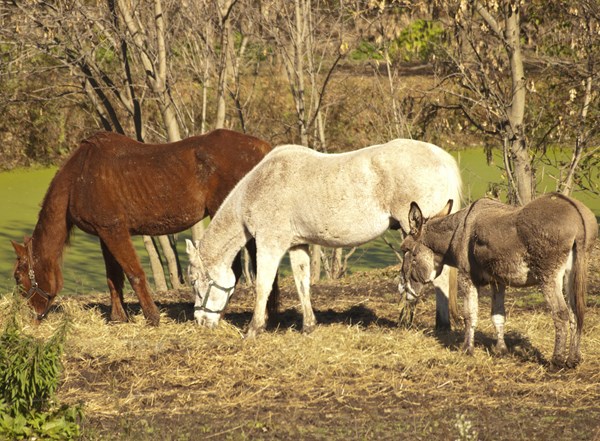 Credit: Thinkstock Horses that graze with donkeys can be exposed to lungworms. While donkeys with lungworms generally won’t show any clinical signs of disease, horses that graze with donkeys can pick up the parasite, which can cause respiratory problems.
Credit: Thinkstock Horses that graze with donkeys can be exposed to lungworms. While donkeys with lungworms generally won’t show any clinical signs of disease, horses that graze with donkeys can pick up the parasite, which can cause respiratory problems.Many horse owners these days (including me) have a donkey or two on their property. They make great companions, and most horse folks think they are adorable. Many of these donkeys have been rescued or are given to farm and stable owners.
Donkeys are asses, so they have some different problems than horses, including a propensity to be easy keepers. One thing that is usually mentioned, but not completely understood, is lungworms that are associated with donkeys.
Horses that graze with donkeys can be exposed to lungworms. While donkeys with lungworms generally won’t show any clinical signs of disease, horses that graze with donkeys can pick up the parasite, which can cause respiratory problems.
Species Specific
We asked Dr. Nathan Voris, a field veterinarian with Zoetis, to give us some basic facts about lungworms in donkeys and horses.
The lungworm found in donkeys is Dictyocaulus arnfieldi, which is different from the lungworm found in cattle (Dictyocaulus viviparous), which causes severe lung damage. These two lungworms do not cross animal species (cattle lungworms don’t infect horses and donkeys), but horses can get lungworms from infected donkeys.
Life Cycle and Description
These internal parasites are up to 80 mm long (3 inches) and are a white worm.
Dictyocaulus spp. are host-adapted, meaning horses are almost never infected unless they are grazing with donkeys, according to Voris. “D. arnfieldi cannot reach adult, reproductive stages in the horse, so an infected horse cannot infect other horses,” he noted. “Infected donkeys are clinically unaffected by lungworm infections, whereas horses can suffer respiratory irritation/bronchitis. In the donkey, adult worms live in the terminal bronchioles and can be found in the major airways. Following reproduction, immature lungworms–or larvae-a-re coughed up, swallowed, then passed in the feces, infecting the pasture.”
What this means is that while lungworms can infect horses, they cannot reproduce in horse—which makes horses a “dead-end host” for this parasite.
“Since horses are not definitive hosts, reproductive stages will not be found in horses,” emphasized Voris. “Therefore, eggs and larvae of Dictyocaulus arnfieldi will not be present in feces, making them difficult to identify as the definitive cause of respiratory disease in the horse.”
Larval culture of donkey feces is the definitive diagnostic tool.
Problems in Horses
In horses that show clinical signs of coughing or respiratory disease, it can be difficult to diagnose lungworms as the culprit. For horses with respiratory problems that graze with donkeys, a veterinarian might take a fecal sample from the donkey to look for the lungworm larvae or perform diagnostic tests to further define the type of Inflammatory Airway Disease (IAD) being experienced by the horse.
“Unlike cattle lungworm infection, equine lungworm infection is restricted to the bronchial tree (the part of the windpipe just before and after it branches to go to each lung) so lung damage, per se, should not occur,” noted Voris. “However, lungworms can cause Inflammatory airway disease, which can be difficult to manage. Unfortunately, lungworm infection can be difficult to definitively diagnose as the cause of the problem and is often diagnosed via ‘guilt by association’ when there is a history of the horse grazing with a donkey.”
Prevention and Treatment
Voris said horses grazing with donkeys are at risk for lungworm infections. “Make sure both the horses and donkeys are dewormed appropriately,” he advised. “Grazing horses and donkeys in separate pastures will prevent exposure.”
Your veterinarian can help advise you on how to best protect your horses and donkeys against parasite infections.


